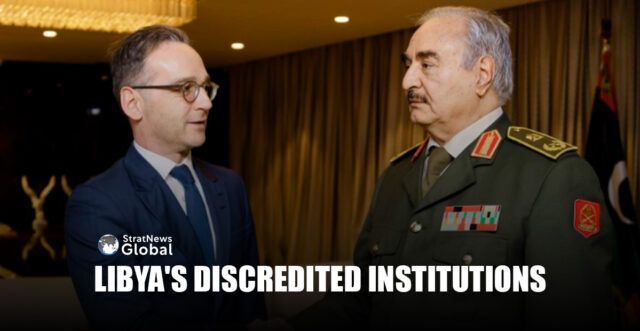The standoff over control of the Central Bank of Libya has hit the country’s oil exports and
threatens a new internal rupture. These are the state institutions whose lack of legitimacy has added to years of crisis.
House of Representatives
Libya’s House of Representatives was elected in 2014 as the national parliament with a four-year mandate to oversee a political transition. But the legitimacy of the 2014 election was disputed and the previous legislature refused to hand over power, accelerating a split between warring factions in the east and west of Libya.
The Libyan Political Agreement in 2015 brought international recognition for the HoR as the legitimate parliament, the High State Council as the consultative second chamber, and a new interim government.
But the deal did not stop the fighting and the House of Representatives stayed in the eastern city of Tobruk, where speaker Aguila Saleh and most of its members backed a parallel government in the east.
Critics of the HoR say its mandate and legitimacy have expired and accuse Saleh of abusing parliamentary rules to push his own agenda. Saleh denies this.
High State Council
The High State Council is drawn from members of Libya’s first transitional parliament elected in 2012. Its leaders rejected the legitimacy of the 2014 election.
Under a 2015 Libyan Political Agreement, the High State Council was formed as a consultative second chamber with an advisory role.
Any major constitutional changes, new governments or appointments to head sovereign institutions were expected to require agreement by both chambers to secure international
backing.
Critics say the High State Council lacks popular legitimacy and acted on behalf of Islamist groups who were dismayed at losing the 2014 election and sought to hang onto power.
Leadership of the HSC has been contested since Aug. 6, when an election among its members came down to a single vote between former head Khaled al-Meshri and his successor Mohammed Takala, who took office a year ago.
Government of National Unity
During a pause in fighting in 2020, a UN backed conference of figures from across the spectrum, agreed to hold presidential and parliamentary elections on Dec 24, 2021.
The conference participants agreed to set up a new presidency council and a Government of National Unity (GNU) to replace the rival governments in east and west and oversee the run up to elections.
The U.N.-backed conference voted to install Abdulhamid al-Dbeibah as head of the GNU and his cabinet was approved by the House of Representatives in March 2021. But disputes over election rules meant the vote never took place.
The House of Representatives then appointed their own rival government saying the mandate of the GNU’s prime minister had expired. The eastern-appointed government has had little clout but its appointment revived Libya’s east-west division.
Presidency Council
The U.N.-backed conference that appointed the GNU in 2020 also chose a three-man presidency council under Abdullah al-Menfi to act as head of state.
The council had only rarely intervened directly in Libyan politics before Menfi’s August 2024 move to replace the Central Bank of Libya governor triggered a crisis.
Central Bank of Libya and National Oil Corporation
Under international and internal agreements, National Oil Corporation is the only body authorised to sell Libyan oil and all revenues must flow into the Central Bank of Libya.
When east and west split in 2014, the eastern authorities appointed new heads of both NOC and the CBL, effectively establishing parallel organisations to those in Tripoli.
While the eastern NOC appeared to have little control over oil operations, the eastern CBL did operate independently, introducing banknotes printed by Russia. However, it did not have access to state oil revenue.
Even through much of the worst bouts of conflict in Libya since 2011, the Tripoli-based NOC has managed to export its oil and the Tripoli-based Central Bank of Libya has paid state salaries, including of many fighters, across front lines.
Maintaining the independence and integrity of these bodies, and reunifying the divided central bank, has been a big focus of international diplomacy.
The continued independence of both has been increasingly called into question after the NOC head was replaced in 2022 and with the crisis over control of the CBL.
Armed Forces
Libya’s armed forces fractured in 2011 and split into myriad warring militias following the overthrow of Muammar Gaddafi.
Former general Khalifa Haftar brought some of them together into a combined force to battle Islamists in eastern areas, calling it the Libyan National Army.
The House of Representatives appointed him as head of Libya’s military in 2015, but internationally recognised governments in Tripoli have never accepted this, and Haftar waged a war on the capital from 2019-20. He still controls most of the east and south.
In Tripoli and the northwest, rival armed factions vie for power and periodically clash over control of territory or resources. Some armed factions have official status under different state institutions and draw on government funds.
With Reuters inputs
















